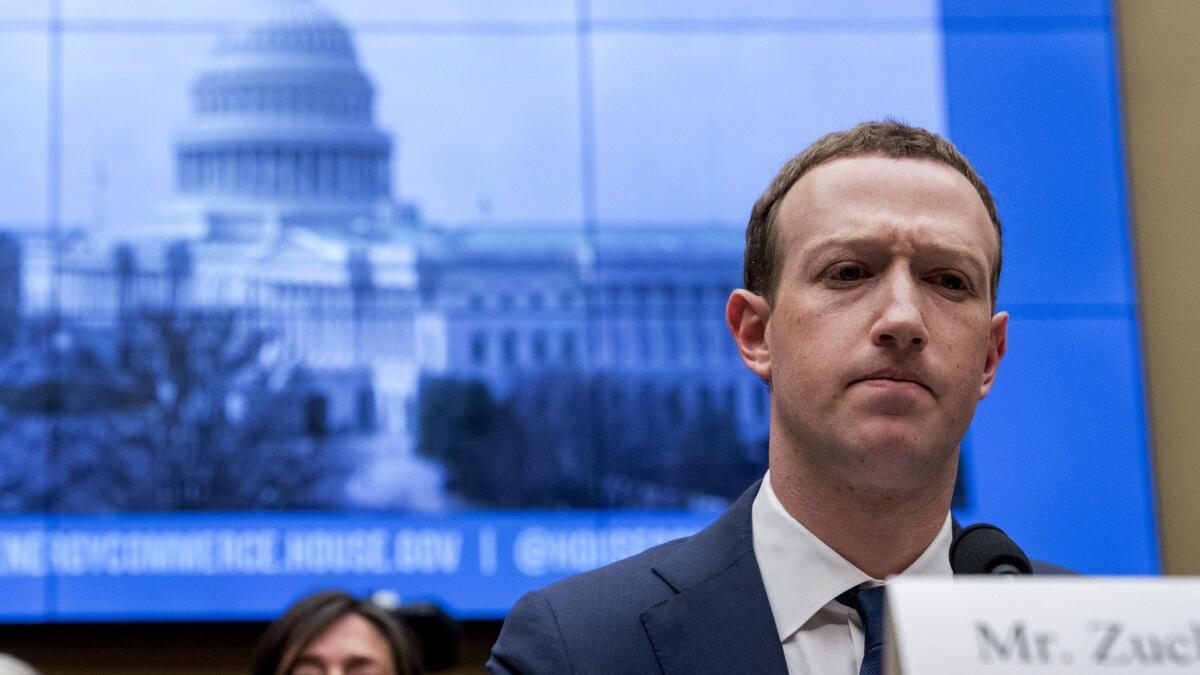Is Facebook’s FTC fine the tip of the iceberg?

Most companies would balk at having to account for a regulatory fine of as much as $5 billion. But not Facebook.
Its shares rose 10% in after-hours trading Wednesday and closed up 6% at $193.26 Thursday, after investors shrugged off news of the anticipated record penalty from the Federal Trade Commission and focused instead on the social network’s strong revenue and earnings performance, excluding the legal charge.
The FTC launched a privacy probe into Facebook in March 2018 in the wake of the Cambridge Analytica scandal, in which the data of 87 million users were improperly accessed by a third party.
Facebook put a number on the potential fine — between $3 billion and $5 billion — and booked a $3-billion accounting charge in its first-quarter results, even though negotiations with the FTC are ongoing. The disclosure served to give clarity to investors, who were aware that a penalty was coming down the track.
But some experts warn that it is too soon to write off Facebook’s regulatory issues. The social network is facing numerous investigations in the U.S. and Europe, while lawmakers in Australia and the U.K. have put forward tough legislative proposals targeting social media platforms.
On Thursday, Canada became the latest country to accuse the company of having broken its data protection laws after an investigation sparked by the Cambridge Analytica affair.
Separately, the Irish data commission, which oversees compliance with the European Union’s new data protection regulations, said it had launched a new probe into the company for exposing hundreds of millions of users’ passwords, the commission’s 11th ongoing inquiry into Facebook apps to date.
“This is definitely not the end for Facebook’s problems, particularly outside the U.S.,” said Sam McGowan, research analyst at Beacon Policy Advisors, the Washington-based analysis group.
“Over the next couple of years, most of the regulatory problems it faces will be in the EU, but it could still face significant antitrust problems in the U.S., depending on the outcome of the 2020 election,” he added.
Democratic presidential hopeful Sen. Elizabeth Warren has said she would break up Facebook if elected. On Wednesday evening, she criticized the potential $3-billion to $5-billion penalty as a “slap on the wrist.”
“Facebook is a repeat offender [and] fines like this won’t stop them from breaking the law [and] violating our privacy again,” she said in a tweet. “It’s going to take big, structural change.”
Facebook’s eventual settlement with the FTC could go beyond the fine to introduce restrictions on the company’s practices that may disrupt its business model and hurt revenues.
Jim Kohm, the head of the FTC’s enforcement division, hinted at such a move last month, when he told Politico, “In addressing alleged [consent decree] violations, the Commission has the option to seek additional conduct remedies as well as monetary penalties.”
Ashkan Soltani, former chief technologist at the FTC, said potential further restrictions could affect the collection of personal data without a user’s knowledge and the sharing or exchange of data with third parties such as app developers.
“To the degree that regulators are concerned with the use of data for micro-targeting and manipulation, such as in the case of Cambridge Analytica, you could imagine injunctions on the ability to micro-target individual users … via custom audiences,” Soltani said.
The prospect is a daunting one for advertisers, according to Debra Aho Williamson, principal analyst at research group eMarketer. “If advertisers were not able to use that precision targeting to the same extent that they have, it could make Facebook a less attractive advertising platform.”
A penalty in the proposed range would mark the largest civil fine ever imposed by the FTC, far surpassing the $22.5 million paid by Google in 2012 for misrepresenting privacy assurances to some users.
It would also be a more significant penalty than could be imposed under the EU’s General Data Protection Regulation, which allows for fines of up to 4% of global revenue. Based on Facebook’s 2018 revenue, the maximum potential fine would be $2.2 billion.
But it was not just Warren who noted that $5 billion represents just under a quarter of Facebook’s 2018 net income, and a ninth of its $41.1 billion in cash and marketable securities at the end of the year.
Some Democrats have called for Facebook’s executives, including Chief Executive Mark Zuckerberg, to be held personally accountable as part of the settlement. Others warned that if the FTC is seen to be weak, it increases the incentive for Congress to introduce legislation regulating the tech giants.
Rep. David Cicilline, the Democratic chair of the House antitrust subcommittee, in a tweet on Wednesday reiterated his warnings that a fine in the “low billions of dollars would amount to a slap on the wrist for Facebook.”
“If the FTC won’t act, Congress has to,” he said.
Murphy, Shubber and Stacey write for the Financial Times.
More to Read
Inside the business of entertainment
The Wide Shot brings you news, analysis and insights on everything from streaming wars to production — and what it all means for the future.
You may occasionally receive promotional content from the Los Angeles Times.










